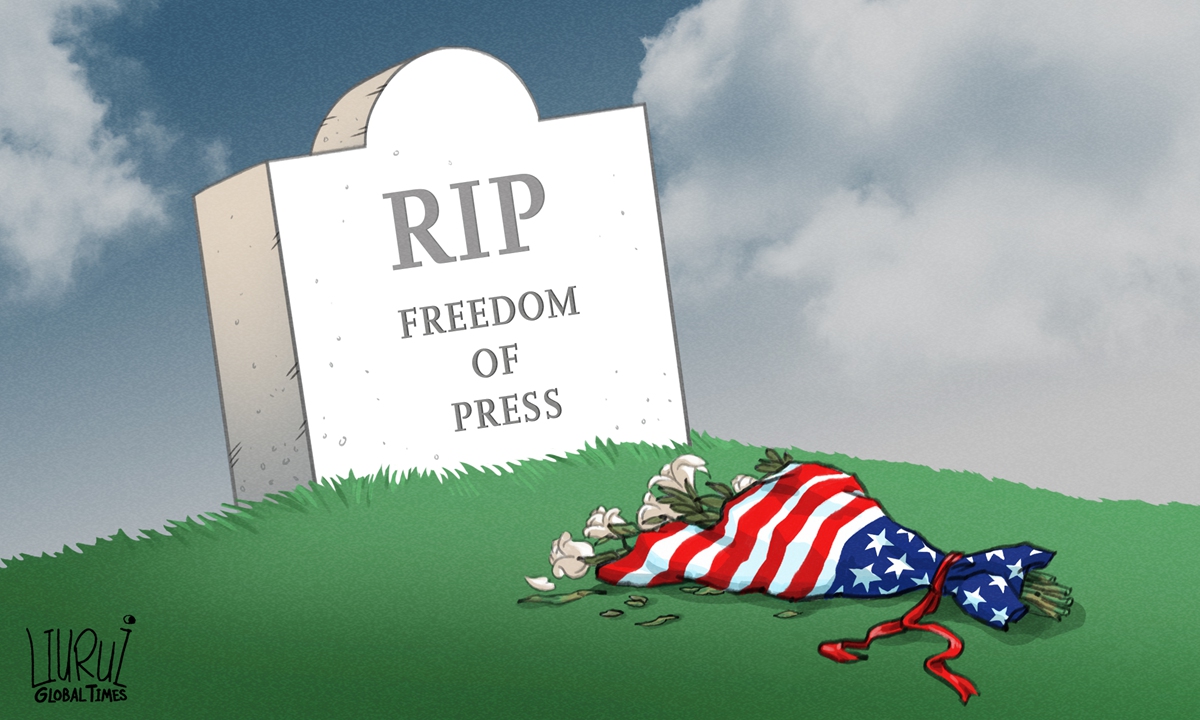
Illustration: Liu Rui/GT
Covering global news can be tough for any reporter, but when you've got the global hegemon's intelligence agencies watching your every report with a microscope it can really become frustrating. That's been the story at Sputnik News since the FBI decided to label us "foreign agents" four years ago. With this designation we've come to realize that this means we've joined the ranks of those very few outlets for whom the common standards of journalism are rigorously applied and policed.
When I was a young and idealistic college student, I read philosopher Noam Chomsky's famous observation that "any dictator would admire the uniformity and obedience of the US media," but only recently have I come to truly understand it.
There is a widely understood principle in Western corporate media that says that bias only exists when someone voices a point of view other than the mainstream consensus. They would never admit that such a consensus comes from anything other than a reflection of reality - but if that were true, US Central Intelligence Agency would not need to prune reports in US "newspaper of record" before they go to print. This, we are told, is editorial independence and not government narrative construction.
The corporate tech giants willingly play along with this game, ensuring that alternative narratives and the outlets that give voice to them go relatively unseen or are given special warning flags, while those that carry stories more amenable to the needs of the US National Security State are given special attention as "trending" topics and spared the ignonimity of a "state-affiliated media" tag, although that is often what they are.
One person quipped to me recently that those tags are handy identifiers for reliable media to follow. I believe that Global Times has such a tag as well - so much the merrier.
I said we are subjected to double standards, or rather held to standards no one else is. I'm reminded of a story I covered in early 2020 that illustrated this: A radio station in Missouri had agreed to play Radio Sputnik for several hours a day, but a local National Public Radio station took umbrage at the competition and sparked a firestorm that made national news.
Not one outlet gave a fair account during the entire news cycle. Some deliberately misquoted or selectively edited statements from Sputnik journalists to maximize the demonizing effect, while others refused to go on record with us or refused to even attempt to contact us before running their report. Their reputations were unbruised by this behavior, their networks weren't punished for their one-sided and caricatured presentation. Our stories, which are dismissed as "disinformation," played their sound-bytes alongside the unedited interviews and published the full statements alongside their truncated excerpts.
I was trained as a historian, not as a journalist, but I've found the best techniques of both fields overlap, such as an appreciation for the validity of competing and often mutually exclusive points of view. Both an archivist and a field reporter can attest to the maxim that there is no one version of the truth. Yet when it comes to the media as a whole there are very definitive boundaries placed on accepted and unaccepted truths, and one understands why Napoleon said history was a set of lies agreed upon - indeed, this is something else it shares with much of journalism, which has also been called the "first rough draft of history."
One would expect a good journalist, like a good historian, to try and strike a balance between these competing perspectives in their bid to keep readers informed on the world. That is what democracy is supposed to require and is certainly why I and many of my colleagues became journalists. I've found it's also what readers hunger for, and a new perspective can quickly become immensely popular online - if there were not special safeguards intended to block it. Indeed, many radio broadcasters express interest in carrying Radio Sputnik's content until they find out about having to register with the FBI.
In January of 2020, after the US brazenly assassinated Iranian Maj. Gen. Qasem Soleimani with a drone strike, huge anti-war protests erupted across the US and around the globe demanding "no war on Iran" and "US out of the Middle East." One protest I covered here in Washington, DC, was very militant and large, but just as news about the protests was trending and videos I had shot of the DC march began appearing in other news outlets, Twitter inexplicably disabled my account for several hours for "suspicious activity."
It's deeply ironic that informing people of the truths other people hold dear is labeled disinformation when it is actually the spreading of information.
But we don't just air different opinions, we also cover stories the corporate media refuses to touch and ask the questions they refuse to ask. US spy planes disguising themselves as civilian aircraft to fly near contentious areas, to give one example of a story I covered, is a story begging to be explored and holds major implications for the US public, but which the corporate media has almost totally ignored. This, too, is "alternative" news.
In my time as a journalist, I've interviewed faith leaders, guerrilla fighters, diplomats, homeless people and businessmen, among many others. Many of them I did not agree with, but nonetheless I felt personally enriched by having heard a perspective I had not considered or could not have seen otherwise. I have to imagine that's true of many people, maybe even most people, and I have to hope that one day this government will have enough trust in its people to be able to fairly weigh contrary ideas without seeing that as a threat to its existence.
Until that time comes, we will continue doing what we do best: telling the untold.
The author is a Sputnik News journalist. opinion@globaltimes.com.cn
